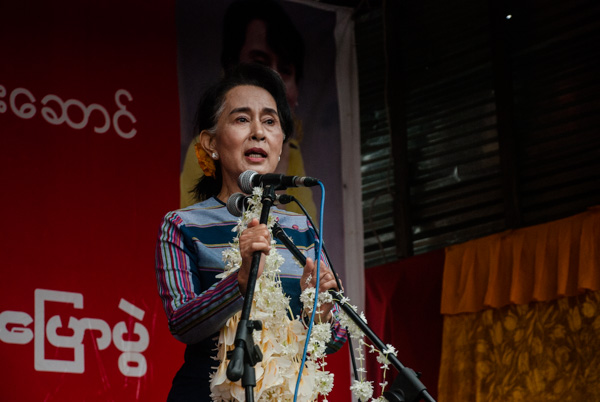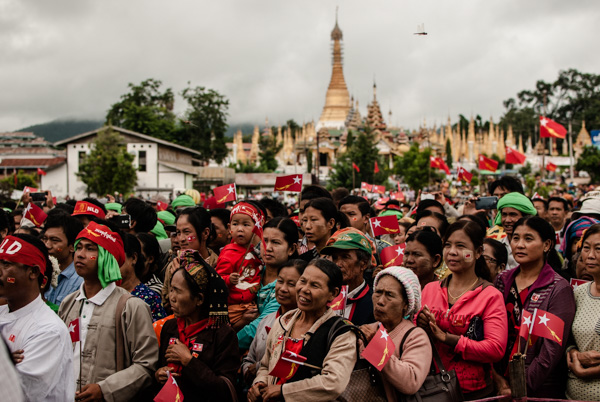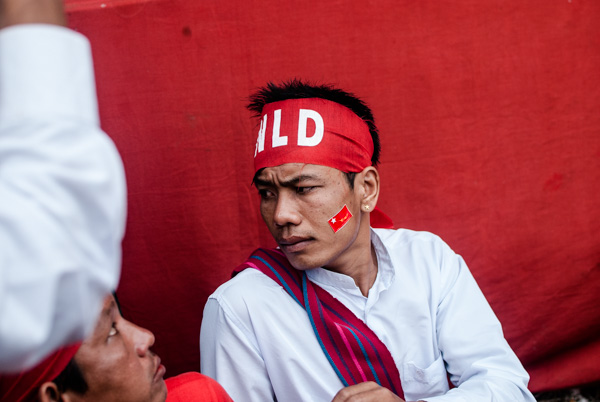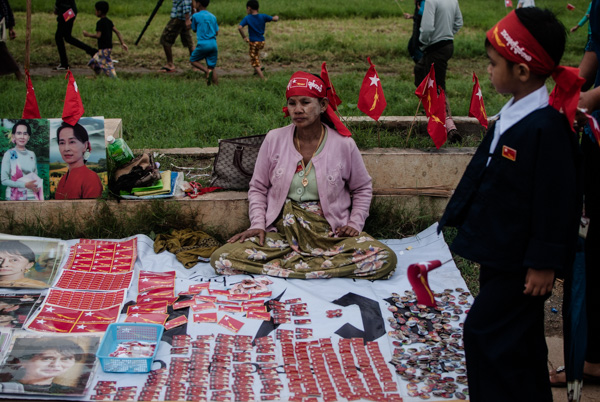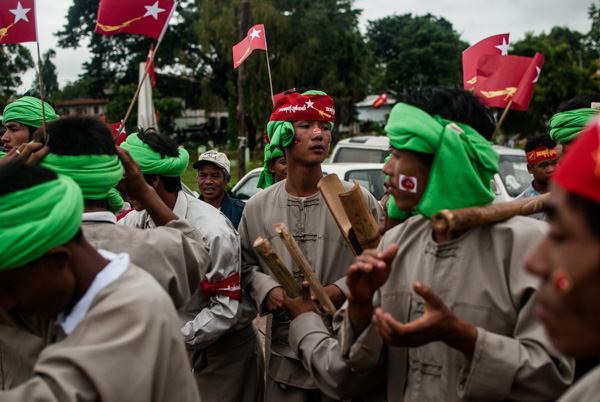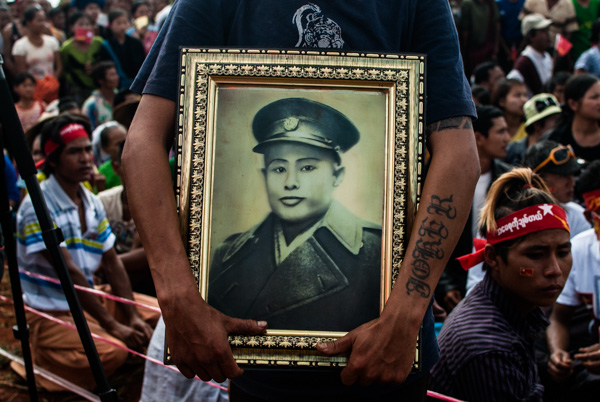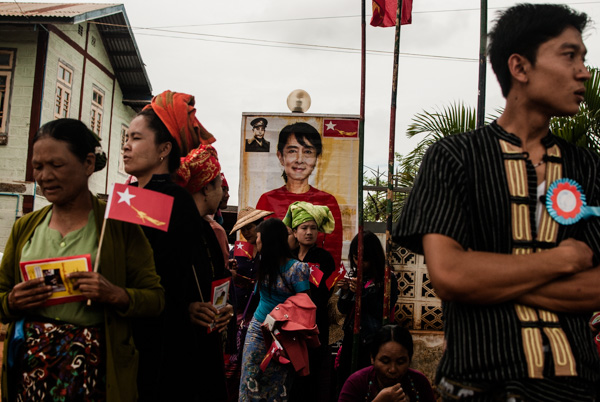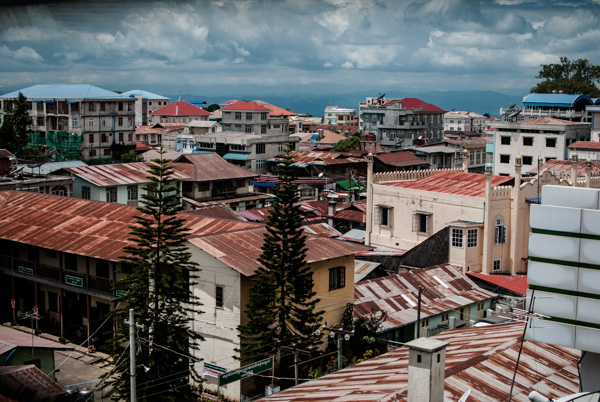Ahead of the official campaign period for Myanmar’s Nov. 8 election, opposition leader Aung San Suu Kyi paid a visit to this township in rural Shan State, where she delivered a speech from the back of a truck beneath a huge red banner and a portrait of her father, the independence hero General Aung San. As elsewhere in Myanmar, “the Lady,” as she is known, demonstrated her singular ability to draw a crowd. In a muddy field an audience of around 1,000 — most of them Shan and Pa’O tribespeople — cheered, chanted and waved flags with the red peacock logo of her National League for Democracy. Others wore headbands printed with the words “We love Mother Suu.”
Suu Kyi appeared in Hsihseng, a rural area of deep green rolling hills around 128 kilometers from the state capital Taunggyi, to make an early pitch for the country’s ethnic vote. Addressing the crowd in measured phrases, she promised to form a government which would address the longstanding grievances of Myanmar’s ethnic minorities, who make up an estimated 30-35% of the population.
“After we become a real federal system, minority ethnic groups will be free from fears and they can independently decide their affairs,” the 70-year-old Nobel peace laureate said, to cheers.
The ethnic minority vote could well hold the key to whether the NLD manages to unseat the ruling, military-backed Union Solidarity and Development Party on Nov. 8. The odds are already against it: with a quarter of the seats in parliament reserved for military representatives as per the constitution, the NLD will have to win twice as many seats as the USDP in order to gain power and elect the country’s next president. And if it is to reach the 333-seat majority it needs, say observers, the party must fare particularly well outside its traditional ethnic Burman heartland.
“In the Union Parliament, 40% of the seats come from the ethnic states,” said Sithu Aung Myint, an independent analyst and political columnist. “The role of the ethnic parties will be very important for the NLD.”
A week after her appearance in Shan state, Suu Kyi visited Kayah state, in the country’s east, another ethnically diverse battleground. In addition to the USDP, which swept the state’s seats in 2010, the NLD is also competing against Aung Min and Soe Thane, two well-resourced former ministers attached to the President’s office, who are running as independents.
Speaking in Demoso township on Sept. 10, Suu Kyi again claimed that in a crowded electoral field, her party was the only one capable of delivering real change. “If we can form government, we will serve the rights of ethnic people and protect them well,” she told a cheering crowd.
To win in ethnic constituencies, the NLD will not only have to trump the wealthy USDP, but also dozens of ethnic political parties boasting a bewildering array of ethnic, political and personal allegiances.
The 2015 election will feature greater involvement by ethnic political parties than ever before. Of the total 91 or so parties participating in the election, 59 represent ethnic or religious minorities, including many that boycotted the last widely derided election in 2010. Yan Myo Thein, a Yangon-based political analyst, predicted that ethnic parties could clinch as much as a fifth of the seats in parliament, emerging as an important third force. “The ethnic parties will become one of the leverage factors in the post-election period,” he said.
One man banking on that result is Sai Aik Paung, chairman of the Shan Nationalities and Development Party, one of Myanmar’s largest ethnic parties. Known locally as the White Tigers, and believed to be linked to the ruling USDP, the SNDP currently holds 58 seats in national and regional legislatures — and Sai Aik Paung is bullish about the party’s chances on Nov. 8. “In Shan state, because the Shan nationals are the majority, they only want to cast their vote for nationals,” he told the Nikkei Asian Review.
From its pool of 208 candidates, the SNDP hopes to win 100 seats, including 50 in the national – or Union – parliament. After that, he said, the party and its partners in the National Brotherhood Federation, a loose alliance of 23 ethnic political parties, will support whichever large party is willing to offer them regional power. “If they want to win the presidency, they have to come and lobby with us,” Sai Aik Paung said, denying that his party would automatically support the USDP. “We will have quite a lot of bargaining power.”
But ethnic parties like the SNDP face some stiff challenges. The main threat is the specter of vote-splitting: in many constituencies, voters will be forced to choose between two or more parties representing their particular ethnicity. In Shan State, for instance, the SNDP is going head-to-head with its local rival, the Shan Nationalities League for Democracy, also known as the Tiger Heads.
In 2010, the White Tigers broke away from the Tiger Heads after the latter decided to boycott that year’s election, and recent attempts to reunite have run aground on disagreements about how far to engage with the current, military-dominated system. In most ethnic areas, parties are divided along similar lines.
So far the only successful merger has been in Rakhine state in Myanmar’s west, where a unified Rakhine National Party looks set to sweep the election in that region. Elsewhere, according to a recent report from the Amsterdam-based Transnational Institute, “the impact of identity politics and vote-splitting along ethnic and party lines may see electoral success falling short of expectations.”
Ethnic splits could be good news for the NLD, but the party still faces obstacles in its bid for the ethnic vote. While Suu Kyi can pull a big crowd in the ethnic states, she is dogged by perceptions of high-handedness in her dealings with local leaders. Counter to expectations, the NLD chose not to broker any alliances with ethnic parties – even those, like the SNLD, which were allies of the NLD in the 1990 election, when it won a massive victory that was subsequently annulled by the military.
Myat Thu, the founder of the Yangon School of Political Science, said many ethnic leaders bristled at the Lady’s “my-way-or-the-highway” style: “There are a lot of bitter feelings among the ethnic minorities over the NLD, and especially over Aung San Suu Kyi. She’s never reached out to them for a strategic alliance, or any form of alliance. They always have to approach her. It’s kind of like she’s arrogant or something.”
Sai Aik Paung depicted a leader out of touch with the grievances of ethnic people. “The majority of ethnic people think that she doesn’t care about our problems,” he said
Some ethnic leaders were particularly angered when the NLD announced it was contesting 1,151 of the country’s 1,171 seats, backtracking on an apparent promise to withdraw from seats where old ethnic allies stood to poll well. “She should not give frivolous promises. If she does, the people and her allies will lose trust in the NLD,” Aye Thar Aung of the Rakhine National Party told local media. Observers say that given their distrust of the NLD, some ethnic parties — including the RNP and SNDP — could well throw their support behind the USDP after the election, increasing its chance of holding onto power.
NLD spokesman Nyan Win said the party’s aim is to win the election first, and address ethnic concerns later. “We are trying to stand for democratic elections. Why are they angry about it?” he asked. “We think we are the only [party] who can compete, to transform the situation and reform the situation.” He dismissed USDP-linked parties such as the SNDP as “only interested in business,” adding, “We have nothing to do with them.”
On Nov. 8, the ethnic vote is likely to be determined by a complex interplay of ethnic allegiances, ideological divides, and the question of whether Suu Kyi can franchise her iconic appeal in remote, conflict-torn regions of the country.
It is clear where Thura Han Htoon Aung’s allegiances lie. The 40-year-old NLD supporter, who has a mixed Kayin and Mon heritage, said that the people were willing to support any leader able to improve their lives – and the Lady seems to fit the bill. “People want change,” he said, standing by a roadside in Hsihseng where ethnic Pa’O were beating drums, awaiting the arrival of Suu Kyi’s motorcade. “They’re waiting for a leader who can change things.”
Published by Nikkei Asian Review, September 17, 2015.


